Kaye Lynne Booth's Blog: Writing to be Read, page 111
February 17, 2021
Craft and Practice with Jeff Bowles – Throw Away Your Outlines FOREVER!
 Each month, writer Jeff Bowles offers practical tips for improving, sharpening, and selling your writing. Welcome to your monthly discussion on Craft and Practice.
Each month, writer Jeff Bowles offers practical tips for improving, sharpening, and selling your writing. Welcome to your monthly discussion on Craft and Practice.My wife recently showed me a new favorite anime series of hers that perfectly illustrates a point I’ve been making about storytelling for years. I didn’t used to like anime all that much, and I’m not sure how you feel about it (if you feel anything about it whatsoever), but like many writers from my part of the globe, I had a certain bias toward a more Westernized approach to storytelling. I didn’t much like the aesthetic of anime, the tropes or the style, but I also wasn’t seeing the big picture. Anime is often judged on its aesthetics, but it should be praised for a preference for bold storylines, creativity, color, imagination, a kind of libertine approach that is no-holds-barred, that exceeds and usually subverts audience expectations.
The truth is there are a million writing advice columns saying it’s a bad idea to head into a writing project without some kind of plan. Sometimes, especially in speculative fiction, copious amounts of planning are advised. Character sheets, outlines, beat sheets, world building tools, map making, story bibles, and a number of other idea-gathering methods are common, and for good reason, I suppose. But in the traditions that gave birth to a medium like anime, form follows function, structure often inhibits form. In other words, rigidity and an unwillingness to let stories guide themselves is at the heart of lots and lots AND LOTS of bad writing.
To produce an animated television show, of course, quite a bit of planning is required. Scripts have to be written, art must be created, there’s a need to hire actors and hold recording sessions, and then post production is always a long process. Large groups of very talented people make this stuff. The animation industry is a machine, one so well-oiled the product itself is viewed and loved all over the globe, regardless of culture or regional storytelling preferences. In contrast, someone who writes fiction or poetry or who dabbles in screenplay, stage production, or even video game writing, is a very much a free agent. But I’d like to ask you to throw all that out the window for a moment, because I want to direct your attention toward something crucial. Storytelling can and perhaps should be artful in addition to being solid, confident, and competent. Storytelling, the best kinds of it anyway, should meet and then exceed audience expectations, and I know of one sure-fire way of doing that: be the author who surprises the author.
Surprise yourself. Anime is an interesting medium to study because it absolutely loves the element of surprise. I know that in the new show my wife introduced me to, every episode contains a wealth of sea changes that completely redirect the flow of the narrative, creating an experience audiences simply cannot predict from one half-our segment to the next. It’s an intense ride, one that has equivalents in Western storytelling. Stephen King, for instance, is famous for espousing a very seat-of-the-pants approach to writing novels. He’s struck by an interesting what-if scenario, starts writing an introductory scene, establishes some initial paradigms, a few working story dynamics, and then he’s off to the races for the next couple months, having no clue where he’ll end up or how he’ll get there.
It’s worth noting that story synthesis requires the introduction, development, and resolution of disparate elements. For example, if I tell you to write a first chapter including a gun, a nun, an assassin, and a vengeful widow, you’ve got four disparate elements that must follow that exact line: introduction, development, resolution. So let’s say the widow is on a quest to kill the assassin who took the life of her beloved, but her religious convictions lead her to a local church where she gets down on her knees and begs a nun to talk her out of committing the ultimate sin of murder.
Where does the story go in chapter two? Imagine the possibilities, reason out the next most likely scenario to occur, given what’s just happened in chapter one (have to use your reasoning, logical brain for this). Repeat that method throughout approximately thirty or forty chapters, and you’ve got yourself a book. Again, if the author of a great story is surprised while they’re in the process of telling it, the reader is likewise guaranteed a similar reaction. It doesn’t mean you’re a sloppy storyteller. It means you’re willing to take a leap of faith, play jazz a little bit, stretch your abilities and find out in an improvisational way what works and what does not.
As you come up with ideas in the moment, you’re likely to want to check them against a few basic questions: does this concept make sense in context? Would my characters really do this and why? How does this dynamic irrevocably change the narrative, and does it take the story in a direction I’m not prepared to go? Constant alterations, redirection, redactions, and tweaks will be required, and you may also find your finished rough draft is in need of serious inserts, deletions, and edits, but the benefits outweigh the grief. Stories that surprise, that don’t hold the audience’s hands, that respect the audience’s intelligence, that’s what can result.
To return to Stephen King for a moment, there is a preponderance of disappearing, reappearing elements in his stories. Some of his most famous novels set, break, and then reset paradigms constantly and consistently. In The Stand, for instance, notice how a story initially about a small group of disparate and scattered pandemic survivors becomes a tale of strong familial community and then a post-apocalyptic holy battle of good vs. evil. King wrote that book without any planning at all, and whenever he got stuck because, you know, he hadn’t planned anything, he simply did something drastic and unexpected to break paradigms he himself had set. Gathering all the pandemic survivors in Boulder, Colorado and setting them up with good lives isn’t enough. There has to be a traitor in their midst, and if a bomb suddenly goes off and kills some fairly important protagonists, what’s the difference? At least we get some more breathing room to play with that wicked story.
Anime also teaches us paradigms can be created and implemented with the intention of shattering them and reassembling and continuing a story on the fly. Just like, I’m afraid, too much outlining can turn an otherwise well-written book into a predictable mess. Decent surprises telegraphed and ruined, characters that behave irrationally because they were and are slaves to dense, inhibiting structure, it’s a bit of a nightmare. It must be noted that in the professional world, a writer isn’t always given the opportunity to create stories on the fly. Publishers and studio executives, game developers, whoever you’re writing for, they like to be sold on ideas before they see a finished product. Call it an insurance policy. But if by chance you don’t care too much about impressing or working for these folks, if you’re of a more independent disposition, I urge you to try a writing approach that eschews too much planning and allows for absolute spontaneity. You may just be thrilled with the results.
I’ll be back next month for another Craft and Practice. See ya, folks, and thanks for stopping by!
Jeff Bowles is a science fiction and horror writer from the mountains of Colorado. The best of his outrageous and imaginative work can be found in God’s Body: Book One – The Fall , Godling and Other Paint Stories , Fear and Loathing in Las Cruces , and Brave New Multiverse . He has published work in magazines and anthologies like PodCastle, Tales from the Canyons of the Damned, the Threepenny Review, and Dark Moon Digest. Jeff earned his Master of Fine Arts degree in creative writing at Western State Colorado University. He currently lives in the high-altitude Pikes Peak region, where he dreams strange dreams and spends far too much time under the stars. Jeff’s new novel, Love/Madness/Demon , is available on Amazon now!
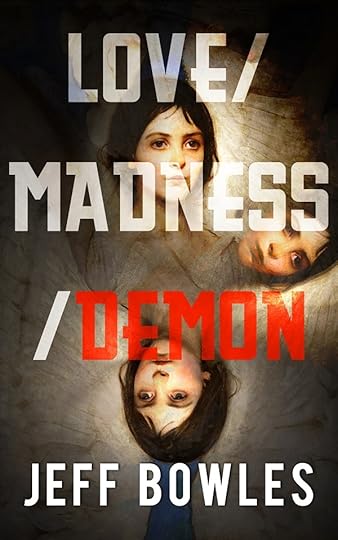
Check out Jeff Bowles Central on YouTube – Movies – Video Games – Music – So Much More!
Want to be sure not to miss any of Craft and Practice with Jeff Bowles segments? Subscribe to Writing to be Read for e-mail notifications whenever new content is posted or follow WtbR on WordPress
February 15, 2021
Welcome to the First Blog Stop on the Feral Tenderness Book Blog Tour
 Feral Tenderness Book Blog Tour
Feral Tenderness Book Blog TourI first met Arthur Rosch online. That was back in 2008, when I was just dipping my toes in the as yet uncertain waters of the internet, and although I didn’t have any idea what I was doing, I started my own social network called “Writer’s World”. Art stumbled onto the “Writer’s World” network somehow and he’s been loyal follower and supporter, and over the years I’ve come to respect him and his writing, and also to call him a friend and valued team member for Writing to be Read.
 Arthur Rosch Author/Poet
Arthur Rosch Author/PoetI’m introducing Arthur Rosch here today because he has a great new poetry and photography collection out, Feral Tenderness. I’m excited about it because I had a hand in editing, compiling and publishing Arthur’s book through WordCrafter Press. Art writes poetry that remains down to earth and real, while hanging out with universal truths. It’s true that some of his ideas may be a little wild, but so are the ideas of many writers. Maybe writing is a safe outlet for all of our crazy thoughts and that’s what motivates us to put words to paper, or screen, as the case may be.
His biography, from the back of his wonderful new release reads:
“Arthur Rosch is a mid-westerner, who became a Californian as a young man. A lover of jazz, poetry, painting and photography, and writing, as well as a passion for astronomy, photography, history, psychology and the weird puzzle of human experience. After receiving Playboy Magazine’s Best Short Story Award for a comic view of a planet where there are six genders, he was immersed in circles that could have taken him to the top, but it was short lived. Arthur found himself reeling, struggling with depression and addiction on the streets for almost a decade, and repairing and rediscovering himself was a defining event in his life, nurturing his literary soul…. “
All of the above is true. These are all truths about Arthur Rosch, yet they are surface level truths; truths that the author chose to share with the world at large, in the back of his book. Let me introduce you the Arthur Rosch, the author who I know.
Art is an undiscovered talent, who once was near the threshold of discovery, only to plummet back down into the depths of reality. But he never let go of the dream, although at times it altered its shape and appearance. He is a literary craftsman and wordsmith, whose words can be found on his blog, Write Out of My Head, on my blog, Writing to be Read, in his books, and various other places online.
Stepping into the world of Arthur Rosch can be a surreal experience, as it was for me when I reviewed his science fiction novel, The Gods of the Gift, because he is a talented craftsman of the written word. Quite a different effect was achieved with Confessions of an Honest Man, a tragic tale of familial dysfunctionalism, mental illness, drug addiction and emotional abuse that has the ability to make the reader suspend disbelief and feel for the main character beyond the conclusion of the book. And his humor shines through his words and is sure to leave readers chuckling in his memoir about life in an R.V., The Road Has Eyes.
 Feral Tenderness
Feral TendernessHis poetry has this same ability to evoke desired images and emotions from within the reader. His photography captures views seen with a unique and unusual eye. The cover for Feral Tenderness was created from one of his photographs, and others are interspersed among the poetry throughout the book, making it an extra special treat for readers.
I do hope you’ve enjoyed this introduction enough to make you want to get to know more about Arthur Rosch and his poetry and photography, by following this tour. We’ve got two interviews with Arthur, and a review of the book coming later in the week, plus some author generated content that promises to be interesting. Stay with us and visit each blog stop as the tour progresses, with a closing post on Art’s blog, Write Out Of My Head, on Sunday. Please join us. You can purchase Feral Tenderness in digital and print on Amazon.
_______________________________________________________________________________________
Like this post? Let me know in the comments. You can be sure not to miss any of Writing to be Read’s great content by subscribe to e-mail or following on WordPress. If you found this content helpful or entertaining, please share.
February 13, 2021
Mind Fields – Driverless Car Traffic Jam
 Mind Fields
Mind FieldsTraffic Jam Of Driverless Cars
January 31, 2026
It was unprecedented, the gridlock on 101 at the San Rafael cloverleaf. Driverless cars are everywhere and drivers are now texting, talking and watching videos. Their indifference is striking. The vehicles no longer require attention to drive down the road. In effect, automobiles have become alternate living rooms, dens, dining rooms, even bedrooms.
The Law Of Unforeseen Consequences has won the day. No one anticipated the social impact of driverless cars. Americans don’t like them. Americans enjoy driving, in spite of their endless complaints about drive time, gridlock and Highway Patrol robocycle stops. Americans miss the power they felt at the wheels of their four ton pickup trucks.
Interviewed at the site of the traffic jam, Ernesto “Corker” Levine said this: “Driverless cars suck!” A chorus of whistles, cheers, and high fives erupted from the crowd that had gathered as drivers left their cars running and milled around on the pavement of Northbound 101. “Suck suck suck” they chanted. Many exchanged business cards and personal porn videos. This kind of traffic jam has replaced tinder as the sex market of the twenty first century.
The jam finally broke up as drivers began to smell burnt wiring. Exploding batteries accelerated the resolution of the epic backup. The farcical dummy cops were instrumental in sorting out the mess with their Skyhooks… Robotic Highway Patrolmen lifted Chevys, Oppenheimers and Teslas and deposited them helter skelter on the margins of the freeway. Owners had difficulty identifying their cars but at least traffic was moving between San Francisco and Santa Rosa. The record-breaking traffic jam extended for thirty miles in both directions. The event was covered by journalists from as far afield as Indonesia and Japan. Some have begun calling it “The Second Woodstock”. Spontaneous appearances by Blue Detergent and Jimi’s Homunculus added luster to the event.
Lead singer Denzel Spurlock testified later at the inquest for “The 101 Incident”. He said, “I know people died, but Man, the whole jam was a gas. We should do it again, soon!”
____________________________________________________________________________________________
 Feral Tenderness
Feral TendernessArthur Rosch is a novelist, musician, photographer and poet. His works are funny, memorable and often compelling. One reviewer said “He’s wicked and feisty, but when he gets you by the guts, he never lets go.” Listeners to his music have compared him to Frank Zappa, Tom Waits, Randy Newman or Mose Allison. These comparisons are flattering but deceptive. Rosch is a stylist, a complete original. His material ranges from sly wit to gripping political commentary.
Arthur was born in the heart of Illinois and grew up in the western suburbs of St. Louis. In his teens he discovered his creative potential while hoping to please a girl. Though she left the scene, Arthur’s creativity stayed behind. In his early twenties he moved to San Francisco and took part in the thriving arts scene. His first literary sale was to Playboy Magazine. The piece went on to receive Playboy’s “Best Story of the Year” award. Arthur also has writing credits in Exquisite Corpse, Shutterbug, eDigital, and Cat Fancy Magazine. He has written five novels, a memoir and a large collection of poetry. His autobiographical novel, Confessions Of An Honest Man won the Honorable Mention award from Writer’s Digest in 2016.
More of his work can be found at www.artrosh.com
Photos at https://500px.com/p/artsdigiphoto?view=photos
_________________________________________________________________________________________
Want to be sure not to miss any of Art’s “Mind Fields” segments? Subscribe to Writing to be Read for e-mail notifications whenever new content is posted or follow WtbR on WordPress. If you find it interesting or just entertaining, please share.
February 9, 2021
Growing Bookworms – Does speed reading matter for kids

When I was ten years old, I was one of a handful of kids in my grade who were selected to attend a speed reading programme. We attended a separate class where we were given a machine with a screen that displayed a page of text. There was a solid covering which moved down the page, covering the text as it descended. I remember having to read quite quickly to finish reading a sentence before it disappeared. The speed with which the covering moved could be increased or decreased by twisting a knob on the side of the reading machine. This was under the control of the reading teacher.

Speed reading suited me and with practice I became a very quick reader. Some of the kids never took to the exercises and gave up quite quickly. I was keen to learn to read faster. Faster meant more books in a day or week. By the following year I was reading 14 children’s books a week and making two trips a week to the local library on my bicycle. I bribed my younger sister into giving me her three library cards. I had four of my own.
I am still a fast reader and can read an average book in a week. I only read for leisure for approximately one hour a day. I rarely read one book at a time and usually have at least two physical books on the go and one audio book. If I get a little tired of one book, I switch over to the other which makes it harder to measure the speed with which I read. Of course, the most important thing with reading is comprehension, there is no point in reading fast if you don’t comprehend the story.
I like to believe I do understand and remember everything I read (unless it is testing my oldest son on his chemistry – that is so deadly boring for me I never remember a single word afterwards). Has my ability to read quicker helped me in my working life. I think it has, I can read and summarise contracts and documents a lot faster than many other people.
This brings me to the benefits of teaching children to speed read.
The way I understand the learning to read process is that young children first learn to recognise and assign sounds to specific letters. Those letters become words that the young reader must decode in order to read. Practice enables the child to recognise words and their reading becomes more accurate and automatic. Once the brain no longer has to focus entirely on decoding words, it is able to focus on comprehension. This is why reading teachers concentrate on reading fluency which is a combination of rate, accuracy and expression. It is, therefore, obvious that rate is not the only factor, but it is important. The quicker a child develops reading fluency, the faster they will achieve good comprehension of the reading material.
Neither of my sons have had the opportunity to learn speed reading. I assume this is because this type of learner extension is no longer provided by schools. It could be because speed reading is not considered to be particularly necessary as one contributor out of three to effective reading. My oldest son reads very quickly and with excellent comprehension. He reads his complex school set works in a short period. His comprehension is good and he scores high marks on language comprehension tests. He would probably be a good candidate for speed reading as he would enjoy the challenge and not lose out on comprehension by reading faster.
Michael, on the other hand, is a slow reader, but he is now quite fluent and accurate. I always start Michael reading his school set works at the beginning of the holidays or school term so that he has lots of time to read the book at his own comfortable pace. I often buy him the audio book too, so that he can listen to the story again after he has read it. Michael also usually scores well on comprehension tests. Michael is motivated by interest and often finds his school set works boring. Trying to get him to read quicker would certainly backfire as he would have to sacrifice comprehension for speed. Slow and steady works well for him.
Possibly the answer is the same as always, you need to understand your child and appreciate their strengths and weaknesses when accessing the best approach for teaching them to read.
Have you done a speed reading programme? Did they offer this at your school or your children’s schools? Do you think it helps to practice reading faster? Let me know in the comments.
If your interested in teaching yourself to speed read, you can learn more about it by watching this YouTube video:
About Robbie Cheadle
Robbie Cheadle has published nine books for children and one poetry book. She has branched into writing for adults and young adults and, in order to clearly separate her children’s books from her adult books, is writing for older readers under the name Roberta Eaton Cheadle.
Robbie Cheadle’s Sir Chocolate children’s picture books are written in sweet, short rhymes which are easy for young children to follow and are illustrated with pictures of delicious cakes and cake decorations. Each book also includes simple recipes or biscuit art directions which children can make under adult supervision. Her books for older children also incorporate recipes that are relevant to the storylines.
Roberta Eaton Cheadle’s supernatural stories combine fabulous paranormal elements with fascinating historical facts.
Children’s picture books – available as a square book and an A5 book (co-authored with Michael Cheadle):
Sir Chocolate and the strawberry cream story and cookbook
Sir Chocolate and the baby cookie monster story and cookbook
Sir Chocolate and the sugar dough bees story and cookbook
Sir Chocolate and the Condensed Milk River story and cookbook
Sir Chocolate and the Sugar Crystal Caves story and cookbook
Sir Chocolate and the Fondant Five story and cookbook
Sir Chocolate and the Ice Cream Rainbow Fairies story and cookbook
Middle school books:
Silly Willy Goes to Cape Town (includes five fun party cake ideas)
While the Bombs Fell (co-authored with Elsie Hancy Eaton)
Poetry book:
Open a new door (co-authored with Kim Blades)
Supernatural fantasy YA novel:
Through the Nethergate
Horror Anthologies (edited by Dan Alatorre):
Spellbound
Nightmareland
Dark Visions
Paranormal Anthologies (edited by Kaye Lynne Booth):
Spirits of the West
Whispers of the Past
Murder mystery Anthology (edited by Stephen Bentley)
Death Among Us
Blog: https://bakeandwrite.co.za/
Blog: robbiesinspiration.wordpress.com
Twitter: BakeandWrite
Instagram: Robbie Cheadle – Instagram
Facebook: Sir Chocolate Books
Want to be sure not to miss any of Robbie’s “Growing Bookworms” segments? Subscribe to Writing to be Read for e-mail notifications whenever new content is posted or follow WtbR on WordPress.
February 8, 2021
The Santa Claus Stories: Where the legend begins
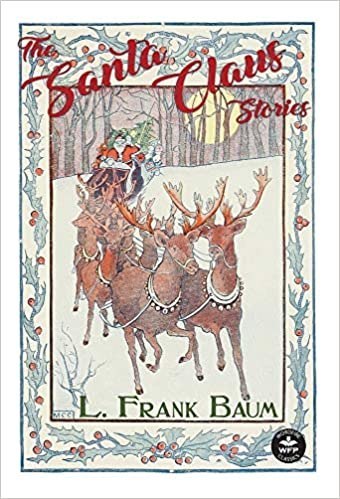 The Santa Claus Stories of L. Frank Baum
The Santa Claus Stories of L. Frank BaumI love reading origin stories, which set the groundwork for all like stories which come after. Although the legend grows and changes down through the years with each retelling. The legend of Santa Claus is one that I hold near and dear to my heart, and I truly enjoyed allowing The Santa Claus Stories of L. Frank Baum take me back to where it all began.
Did you ever wonder where Santa Claus comes from, or how he got to be Santa Claus? Ever wonder how he came to deliver toys to children all around the world? Or why he only delivers one night out of the year? Or why he wears red? Or why he comes down the chimney? Or where his magic comes from? The Santa Claus Stories of L. Frank Baum answer those questions and more. And I’m guessing that not many people today are aware that Santa Claus was in attendance for Princess Ozma’s birthday party in the land of Oz, along with Dorothy and Toto, the scarecrow, the lion man, the tin man, and many other of Baum’s colorful and memorable characters.
The literary value of classic stories such as these is beyond my abilities to describe. Although I feel unqualified to rate classic gems, such as this one, these stories left me with a good feeling inside. Here is born the true spirit of Christmas and you can see the origins of the Santa Claus legend offered here in many contemporary Santa Claus stories. In Baum’s telling, his reindeer don’t fly, but they do wear bells, and magic is in the air, as Santa toils to make all of the toys for the children year round by himself. Over the years things have changed a bit, but I think the magic is still in our hearts, if we look for it.
__________________________________________________________________________________________________________________
Kaye Lynne Booth does honest book reviews on Writing to be Read in exchange for ARCs. Have a book you’d like reviewed? Contact Kaye at kayebooth(at)yahoo(dot)com.
February 7, 2021
Review of the Spirits of the West Western Paranormal Anthology by Patty L. Fletcher: Blog Tour Day 7
Join us as we wrap up the “Spirits of the West” book blog tour with a review by Patty Fletcher over at “Patty’s World”.

Spirits of the West Western Paranormal Anthology
Compiled and Edited by Kaye Lynne Booth
Reviewed by Patty L. Fletcher
Spirits of the west are often found in unexpected places. They can be found in a saloon in Colorado territory, on a wagon train in South Africa’s plains, or on a distant planet in another galaxy. They can be the bringers of revenge or the protectors of the weak. Indulge yourself in eight unique paranormal stories with western spirit in Spirits of the West.
Over the past week, we’ve all been treated to a rather unique blog tour featuring a wonderful anthology with the theme of western paranormal.
If it’s one thing I’ve learned over the years from reading westerns, it’s that in the old west, there are many tales of ghosts, spirits, and if one looks hard enough, a witch or two.
I love such tales, so when I was…
View original post 293 more words
February 6, 2021
Glimpsing the Wanekia by Jeff Bowles ~ Spirits of the West Anthology
Day #6 of the “Spirits of the West” book blog tour finds us over at Sue Vincent’s Daily Echo, where we get a glimpse into the mind of Jeff Bowles, and the thoughts behind his story, “Wenekia”. Please join us.

Spirits of the West are often found in unexpected places. They can be found in a saloon in Colorado territory, on a wagon train in the plains of South Africa, or on a distant planet in another galaxy. They can be the bringers of revenge or the protectors of the weak. Indulge yourself in eight paranormal stories with western spirit in Spirits of the West…
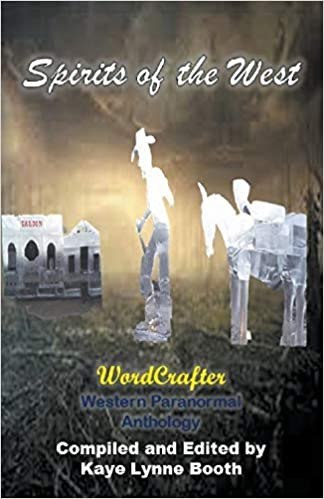
Amazon.com or Amazon UK.

Jeff Bowles
Ever since I was little, I had the sense there was another world lurking beyond this one. That if you could just peel back the shaggy off-colored wallpaper of reality, you could glimpse another universe entirely, one that might or might not have your best interests at heart.
I wrote Wanekia about twelve years ago, when I was just starting to get my feet under me as…
View original post 842 more words
February 5, 2021
#SpiritsoftheWest #Blogtour – Day 5: The Ghost in the Mound and a review
Day #5 of the “Spirits of the West” book blog tour brings a look into the setting for Roberta Eaton Cheadle’s story, “The Ghost in the Mound” and her review of the stories from the other contributors on Robbie’s Inspiration. I do hope you’ll join us there.
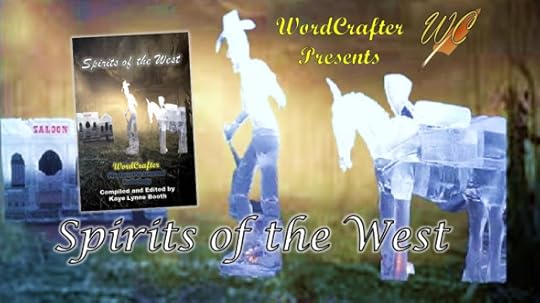
Day 5 of the Spirits of the West book tour hosted by WordCrafter Press sets out some background to my short story, The Ghost in the Mound. I’ve also included my review of the stories other than mine that feature in Spirits of the West anthology
You can find out more about the tours WordCrafter is offering here: https://writingtoberead.com/wc-book-blog-tours-2/.
The Ghost in the MoundBackgroundMy second short story in Spirits of the West is The Ghost in the Mound. This story features an enormous termite mound.
Termite mounds are constructed by a specific type of termites found in African, Australia and South America. The mounds can be large, sometimes with a diametre of 30 metres.
In African savanna areas, termite mounds form ‘islands’ with high tree densities. This is attributed to the fact that due to the digging of the termites and their decomposition of plant material; the…
View original post 586 more words
Mind Fields – My Pandemic Peace
 Mind Fields
Mind FieldsI am a janitor. I have worked at the same medium sized commercial property for thirty years. It is a job made in heaven! The pay is good, and I set my own hours. I never see my boss. We exchange emails and a check arrives monthly. The pandemic has done little to change my lifestyle. Properties tend to fall apart without the basic services supplied by cleaners and contractors. I work part time as a janitor and the other part time I stay home and practice the piano and write. My janitorial work includes maintaining two public restrooms. This requires a maximum of personal protection gear. Mask and gloves combined with frequent washing are keeping me (I hope) safe from infection.
My spouse is disabled and spends most of her day in bed. I care for her and keep supplies flowing. She suffers from COPD and Rheumatoid Arthritis. My life is not much different from the time before Covid-19. I go out less and I buy at least a week’s supplies so that I don’t have to return to the store and its dangers of exposure. Judging by the basket loads being checked out by my fellow shoppers, we are feeling much the same.
The adaptations to Covid-19 quickly normalize. I see my therapist via Skype or Doxy.me.com. I would rather see her in person, but seeing her on my computer screen offers a strange and intangible compensation. I can only call it “looseness”, i.e. I am more likely to say something awkward, which, as you may know, is the good stuff when it comes to psychotherapy. I must speak the uncomfortable truth. In this way, Covid has presented a weird therapeutic gain.
I communicate via computer and attend my weekly Senior Peer Counseling groups via Zoom. I don’t have to drive! No gasoline, no oil changes, no flat tires. No traffic! I acknowledge the vast suffering that attends this pandemic. I can’t allow my compassion to be blunted by my relative comfort. The plain truth is that Covid-19 has made my life easier.
I have been a Certified Senior Peer Counselor for three years. This effort offers support to those who are over 55 years of age. I now see my clients via all means possible, be they phone, computer, tablet, holograph, astral projection, quantum entanglement, ubiquitous electron transfer, psychic channeling or yelling out the window. Somehow, the process seems to be effective.
A couple of times a week I make my way up and down Highway 101. It’s a fifty mile round trip and sometimes the highways are virtually deserted. It’s kinda spooky! So far, my personal pandemic has been more of a windfall.
I’m 73 years old. Officially, that makes me a senior citizen. I’m active, creative, mobile, flexible, and in good health. If I tell you that this is due to my excellent personal hygiene, I would be gaslighting you with a heavy frosting of irony. I’ve been addicted to heroin, cocaine, alcohol, tobacco and other bad behaviors. I am a paradox. I have faithfully practiced yoga since the age of eighteen. There have been times when I would inject myself with a speedball, smoke several cigarettes and do a sequence of yoga postures within the same hour. I’m not like that anymore. I’ve worn out my addictions through a steady incremental process, aided by psychotherapy. There was no sudden cure, no breakthrough, just years of steady work. I AM, at last, closer to where I want to be. All I have to do is avoid suddenly dropping dead.
Count to three. I haven’t dropped dead. This means that I have a responsibility to continue writing. My mentor, the incredible KL Booth, urges me to supply essays, poems, and other material to the ongoing work of the web platform Writing To Be Read. This site is a forum for writers and provides essential exposure for those of us who don’t have the proper connections to achieve big time literary fame.
There is truth to the maxim that “You have to know someone.” There was a time when I did indeed know someone. I knew the fiction editor at Playboy Magazine. Her name was Vicki Chung. I got to know her through a series of flukes that led to my winning Playboy’s award for Best Story Of The Year. After winning that award, I was invited to Playboy’s 25th anniversary banquet in New York City, all expenses paid. A room at the Waldorf was booked for me. The banquet guest list was loaded with influential writers, editors, agents and publishers. I had gone to Nirvana. They had a wall-sized poster illustration of my award winning short story. I was courted by everyone. I returned from New York City with my pockets full of business cards. “Call me when your manuscript is ready.” They all said that.
A few months later there was a plane crash near Chicago’s Ohare airport. Most of Playboy Magazine’s literary staff was on that plane. My friend Vicki was gone. My connections were gone.
Later that year my manuscript was stolen. It was the only copy because I was making corrections. At the time I was devastated, but I now know that it was a shit novel, that it was juvenile, pretentious and hopeless. The thief saved me from gruesome embarrassment.
Pandemic? Are we in a pandemic? I think it’s more like a correction, the way the theft of my manuscript was a correction. That sounds cold, but nature doesn’t consider the will of individuals as it operates our planet. Nature does what is best for itself. Covid-19 may be nature’s response to massive overpopulation and utterly depraved management of this stately orb.
That’s my theory, anyway.
___________________________________________________________________________________________
 Feral Tenderness
Feral Tenderness
A Midwesterner by birth, Arthur Rosch migrated to the West Coast just in time to be a hippie but discovered that he was more connected to the Beatnik generation. He harkened back to an Old School world of jazz, poetry, painting and photography. In the Eighties he received Playboy Magazine’s Best Short Story Award for a comic view of a planet where there are six genders. The timing was not good. His life was falling apart as he struggled with addiction and depression. He experienced the reality of the streets for more than a decade. Putting himself back together was the defining experience of his life. It wasn’t easy. It did, however, nurture his literary soul. He has a passion for astronomy, photography, history, psychology and the weird puzzle of human experience. He is currently a certified Seniors Peer Counselor in Sonoma County, California. Come visit his blogs and photo sites. www.artrosch.com and http://bit.ly/2uyxZbv.
Arthur’s books include The Road Has Eyes, The Gods of the Gift, and Confessions of an Honest Man. His lifetime collection of poetry and photography, Feral Tenderness, is soon to be released by WordCrafter Press.
_____________________________________________________________________________________________
Want to be sure not to miss any of Art’s “Mind Fields” segments? Subscribe to Writing to be Read for e-mail notifications whenever new content is posted or follow WtbR on WordPress. If you find it interesting or just entertaining, please share.
February 4, 2021
Spirits of the West – Blog Tour – Don’t Eat the Pickled Eggs!
For Day #4 of the “Spirits of the West” book blog tour, we’re over at Jessica Bakker’s blog. Drop by to learn more about my story in the anthology, “Don’t Eat the Pickled Eggs!”. See you there.
I love a good anthology, and when an anthology is about ghosts, the West, and the supernatural, AND has a story in it titled ‘Don’t Eat the Pickled Eggs’…you know I’m going to be grabbing a copy! Please enjoy with me, Kaye Lynne Booth’s blog tour and introduction of her anthology, Spirits of the West.
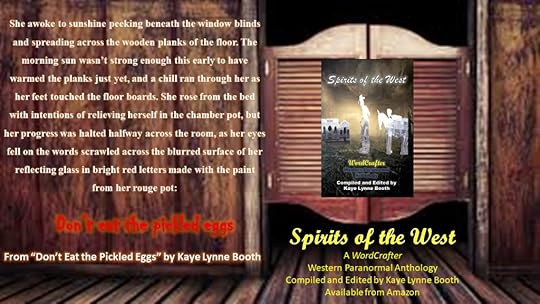
Do you believe in ghosts? I think there is something inside every one of us that makes us want to believe, but not all of us do. That’s what makes a good ghost story so attractive. I mean, who doesn’t enjoy a good ghost story? I know I do.
I also believe that every story carries a grain of truth. We bury many real-life experiences and dreams in the subconscious, but often, they are not content to stay there, so we allow them to poke their heads up and see the light of day…
View original post 576 more words
Writing to be Read
- Kaye Lynne Booth's profile
- 37 followers







